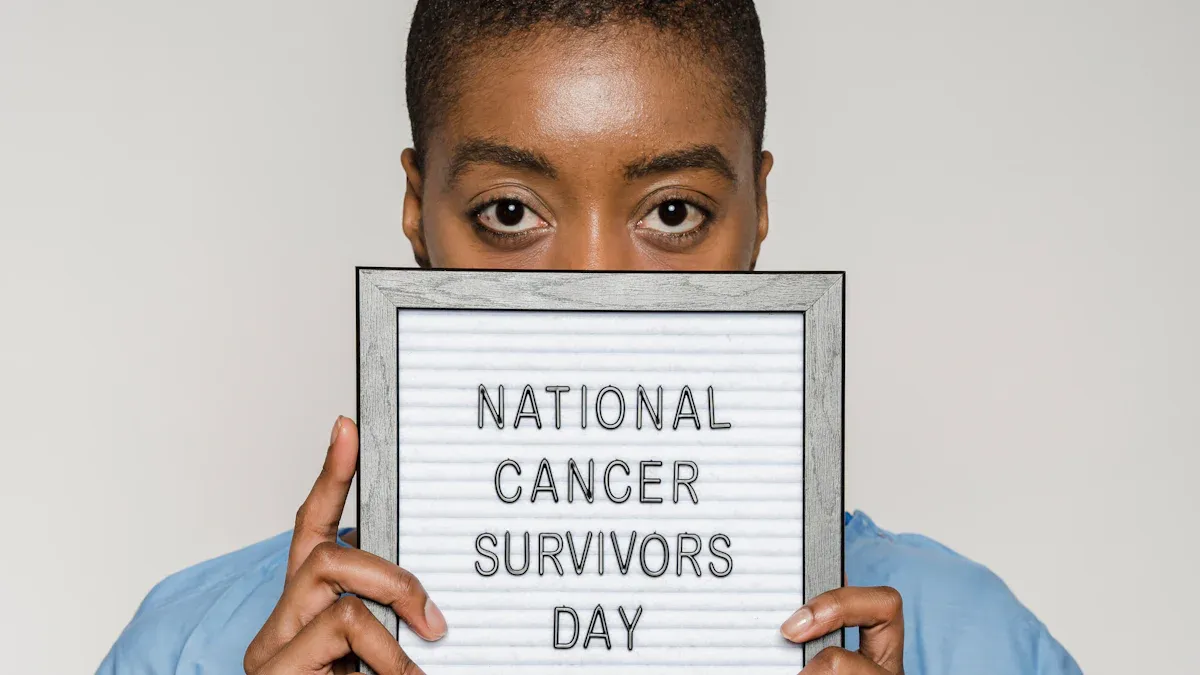How to Build Emotional Strength During Cancer Treatment

Facing cancer treatment can feel overwhelming. The emotional toll often matches the physical challenges, with up to 25% of patients experiencing clinical depression. Persistent sadness, fatigue, and anxiety can make daily life seem daunting. Without support, these feelings may escalate into serious mental health struggles.
Building resilience is crucial during this journey, and emotional strength is your greatest ally. Patients with higher resilience report greater life satisfaction and better coping strategies. By utilizing the insights from "Building Resilience: Psychological Tools for Cancer Patients," you can shift your focus from fear to hope, empowering yourself to face each day with courage. Remember, emotional strength is not something you're born with—it’s something you can grow.
You are stronger than you think. With the right tools and support, you can navigate this journey with grace and determination.
Key Takeaways
Emotional strength is a skill you can learn. Notice your feelings and ask for help to grow stronger.
Having support from others is very important. Tell your family and friends what you need so they can help you better.
Mindfulness, like meditation or deep breathing, lowers stress and helps you feel better. Try to do these every day.
Celebrate small wins to feel good. Even tiny progress can keep you positive.
Talk to mental health experts for advice. They can give you tips and support to handle tough emotions.
Understanding Emotional Strength
Defining Emotional Strength
Emotional strength is your ability to manage feelings, adapt to challenges, and maintain a sense of balance during tough times. It’s not about avoiding emotions but learning how to face them with courage and clarity. Research shows that emotional strength plays a vital role in overall health and well-being. Building this strength early in life creates a foundation for resilience, helping you navigate difficulties with greater ease. Interestingly, studies also link good nutrition to emotional resilience, suggesting that what you eat can influence your mental and emotional health.
Think of emotional strength as a muscle. Just like physical muscles grow stronger with exercise, your emotional strength grows when you practice self-awareness, self-care, and positive coping strategies. It’s a skill you can develop, no matter where you are in life.
Tip: Start small. Acknowledge your feelings and remind yourself that it’s okay to seek help when needed. Each step you take builds your emotional resilience.
Relevance of Emotional Strength in Cancer Treatment
During cancer treatment, emotional strength becomes a powerful ally. It helps you face the uncertainties and challenges of your journey with hope and determination. Studies highlight that emotional support can significantly reduce stress, improve mental health, and enhance your overall quality of life. For example:
Evidence | Description |
|---|---|
Emotional Support | Lowers stress levels, boosting health outcomes. |
Anxiety and Depression | Reduces negative emotions, fostering resilience. |
Patient Experience | Improves quality of life through support groups. |
Building emotional strength also strengthens your ability to stick to treatment plans and collaborate effectively with caregivers. Strategies like setting realistic goals and embracing positivity can keep you motivated and focused. A strong support system, mindfulness practices, and professional guidance further enhance your resilience.
Remember, emotional strength doesn’t mean you won’t feel fear or sadness. It means you’ll have the tools to face those emotions and keep moving forward.
The Psychological Impact of a Cancer Diagnosis
Emotional Challenges Faced by Cancer Patients
Receiving a cancer diagnosis can feel like an emotional earthquake. You might experience a whirlwind of feelings, from shock and fear to sadness and anger. These emotions are natural, but they can also be overwhelming. Many patients report sleep disturbances, constant worry, and difficulty concentrating. For some, these feelings evolve into deeper struggles like anxiety or depression.
Studies show that about 50% of cancer patients adapt successfully to their diagnosis. This resilience often stems from staying active, expressing emotions, and seeking support. However, the other half may face significant emotional hurdles. Tools like the Distress Thermometer (DT) and the Patient Health Questionnaire–4 (PHQ-4) help measure emotional distress, offering a starting point for addressing these challenges.
Tip: Acknowledge your feelings and share them with someone you trust. Talking about your emotions can lighten the burden.
Stress, Anxiety, and Depression in Cancer Patients
Stress, anxiety, and depression are common among cancer patients. These mental health challenges can affect your treatment outcomes and overall well-being. Chronic stress, for example, weakens the immune system, potentially slowing recovery. Anxiety and depression can also increase the risk of cancer recurrence and mortality.
Barriers like stigma and limited physician time often prevent patients from seeking help. Yet, addressing these issues is crucial. Routine mental health screenings, especially for breast cancer patients, are recommended to improve prognosis and quality of life.
Remember, seeking help for mental health is a sign of strength, not weakness. You deserve care for both your body and mind.
Emotional Health and Its Role in Physical Recovery
Your emotional health directly impacts your physical recovery. Research highlights that psychotherapy, relaxation training, and mindfulness techniques can reduce pain, improve sleep, and ease depression. These benefits boost energy levels and strengthen immunity, aiding your healing process.
Building a strong support network also plays a vital role. Surrounding yourself with family, friends, and healthcare providers creates a healing environment that promotes comfort and resilience. Healthy lifestyle choices, like balanced nutrition and regular exercise, further enhance both emotional and physical wellness.
Note: Emotional resilience grows when you combine medical, emotional, and social resources. Take small steps each day to nurture your well-being.
Building Resilience: Psychological Tools for Cancer Patients

Professional Support and Therapy
Benefits of Cognitive Behavioral Therapy (CBT)
Cognitive Behavioral Therapy (CBT) helps you identify and change negative thought patterns. It equips you with tools to manage stress and anxiety effectively. By focusing on the present, CBT encourages you to replace unhelpful thoughts with constructive ones. This approach improves emotional resilience and enhances your ability to cope with challenges. Engaging with mental health professionals through CBT provides a safe space to express emotions and develop personalized coping strategies. Studies show that resilience positively correlates with improved quality of life, making CBT a valuable tool during cancer treatment.
Supportive-Expressive Group Therapy
Supportive-Expressive Group Therapy fosters a sense of community. It allows you to share experiences with others facing similar challenges. This therapy emphasizes emotional expression and mutual support, helping you feel less isolated. Research highlights that emotional support reduces distress and enhances mental health. Patient navigators and group therapy sessions play a crucial role in providing resources and emotional care. These interventions help you build resilience by creating a network of understanding and encouragement.
Mindfulness and Relaxation Techniques
Meditation and Deep Breathing Exercises
Mindfulness techniques, such as meditation and deep breathing, help you focus on the present moment. These practices break cycles of negative thinking and reduce stress. Studies reveal that mindfulness improves sleep, alleviates depression, and enhances overall quality of life. Deep breathing exercises calm your mind and body, promoting relaxation and emotional balance.
Progressive Muscle Relaxation
Progressive Muscle Relaxation (PMR) involves tensing and relaxing muscle groups systematically. This technique reduces physical tension and fosters a sense of calm. PMR can improve sleep quality and decrease anxiety, making it an effective tool for managing stress during cancer treatment. Incorporating PMR into your routine strengthens your emotional resilience and supports your healing journey.
Positive Psychology Interventions
Reframing Negative Thoughts
Reframing negative thoughts helps you view challenges from a different perspective. Instead of focusing on difficulties, you learn to identify opportunities for growth. This shift in mindset enhances emotional well-being and builds resilience. Research shows that positive psychology interventions significantly improve emotional strength, helping you navigate cancer treatment with optimism.
Celebrating Small Wins
Acknowledging small victories boosts your morale and keeps you motivated. Whether it’s completing a treatment session or enjoying a good day, celebrating these moments reinforces your progress. Cancer survivors often report a renewed appreciation for life and closer relationships with loved ones. Embracing positivity strengthens your emotional resilience and fosters a sense of gratitude.
Tip: Incorporate these tools into your daily routine. Each step you take builds your emotional strength and helps you face challenges with confidence.
Strengthening Support Networks
Family and Friends as Key Support Systems
Your family and friends are your greatest allies during cancer treatment. They provide emotional support, practical help, and a sense of belonging. A strong support network can ease your stress and improve your overall well-being. Studies show that patients with robust support systems experience better treatment outcomes and a higher quality of life.
Emotional support from loved ones helps you feel understood and less isolated.
Practical assistance, like help with daily tasks, reduces your burden and allows you to focus on recovery.
Access to resources through your network ensures you get the care and information you need.
Tip: Let your loved ones know how they can help. Even small gestures, like a kind word or a shared meal, can make a big difference.
Effective Communication of Needs
Clear communication is key to building a strong support system. Your loved ones want to help, but they may not always know how. Expressing your needs openly allows them to provide the right kind of support.
Use simple and direct language to share your feelings and concerns.
Be specific about what you need, whether it’s a ride to treatment or someone to talk to.
Encourage open dialogue so everyone feels comfortable sharing their thoughts.
Remember, asking for help is a sign of strength, not weakness. Your loved ones are there to lift you up.
Maintaining Physical and Emotional Balance
Staying Active During Treatment
Staying active during treatment can boost your mood and energy levels. Regular physical activity, even gentle exercises like walking or stretching, helps reduce stress and improve your emotional well-being. Healthcare providers often recommend tailored exercise plans to suit your needs and abilities.
Physical activity releases endorphins, which enhance your mood.
Exercise improves sleep quality and reduces fatigue.
Staying active helps you maintain a sense of normalcy and control.
Note: Always consult your doctor before starting any exercise routine. They can guide you on what’s safe and effective for you.
The Connection Between Physical and Emotional Health
Your physical and emotional health are deeply connected. Cancer is not just a physical illness; it’s an emotional journey too. Up to 25% of patients experience clinical depression, which can impact recovery if left unaddressed. Mindfulness techniques, like meditation, can ease depression and improve sleep. Regular physical activity also enhances your emotional resilience.
Engaging with mental health professionals helps you manage emotions and develop coping strategies.
Building a strong support network provides comfort and encouragement.
Balancing physical activity with emotional care creates a holistic approach to healing.
Taking care of your body and mind together strengthens your ability to face challenges. Small steps each day lead to big improvements over time.
The Role of Personalized Care and Support Systems

Tailoring Psychological Tools to Individual Needs
Every cancer journey is unique, and so are the emotional needs that come with it. A personalized approach ensures that the psychological tools you use align with your specific challenges and strengths. Some patients may need intensive follow-up care, while others might benefit from self-management strategies. Tailoring these tools can prevent long-term psychological issues and improve your overall quality of life.
Self-management techniques, such as monitoring symptoms and managing emotional responses, empower you to take control of your mental health.
Face-to-face interventions often yield the best results, offering a personal connection that fosters trust and understanding.
Online therapies provide flexibility, especially if attending in-person sessions is difficult.
Intervention Type | Effectiveness | Notes |
|---|---|---|
Face-to-face interventions | Most effective | Personal interactions are crucial for delivering psychological interventions. |
Online interventions | Significant in global and emotional domains | Effective for patients unable to attend in-person sessions. |
Individual therapies | Significant improvements in all domains | Preferred by patients over group therapy due to personal fears. |
By working with your healthcare team, you can identify the tools that suit your needs best, ensuring a more effective and supportive experience.
The Role of Healthcare Providers in Emotional Resilience
Your healthcare providers play a vital role in building your emotional resilience. They don’t just treat your body—they support your mind and spirit as well. Mental health professionals can guide you through coping techniques, while oncologists and nurses can help you set realistic goals for your treatment journey.
Engage with mental health professionals to express your emotions in a safe space.
Build a strong support network with the help of your care team.
Practice mindfulness techniques to manage stress and maintain balance.
Healthcare providers also help you navigate the emotional challenges of treatment by fostering hope and positivity. Their guidance ensures you feel supported every step of the way.
Integrating Holistic and Patient-Centered Approaches
A holistic approach addresses not just your physical symptoms but also your emotional and social well-being. This method integrates disciplines like social work, psychiatry, and palliative care to create a comprehensive support system. For example, oncology social workers can streamline your care and connect you with resources tailored to your needs.
Key Findings | Implications for Care |
|---|---|
Navigation-based programs reduce health disparities | Need for assessing distress, anxiety, and depression in patients |
Importance of social determinants of health | Referrals to interprofessional team members for patient-centered care |
By focusing on your unique circumstances, holistic care improves your quality of life. It ensures that every aspect of your journey—physical, emotional, and social—is addressed with compassion and expertise.
Tip: Advocate for care that sees you as a whole person, not just a diagnosis. You deserve a treatment plan that nurtures every part of you.
Building emotional strength is essential for overcoming the challenges of cancer treatment. It empowers you to face each day with courage and determination. Research shows that emotional resilience improves survival rates, reduces recurrence, and enhances quality of life.
Outcome Type | Statistical Measure | Findings |
|---|---|---|
Overall Survival (OS) | Moderate heterogeneity in survival data | |
Recurrence-Free Survival (RFS) | I2 = 23% | Low heterogeneity in survival data |
Quality of Life (QoL) | Significant improvements in all domains | Emotional domain showed the highest clinical effect |
Timeframe of QoL impact | 2 to 26 years post-diagnosis | Long-term effects of psychological support on QoL |
Consistent emotional support from healthcare providers also reduces stress, leading to better health outcomes. You can take small steps daily to build resilience. Celebrate your progress, lean on your support network, and embrace tools that nurture your well-being.
Emotional strength is not fixed—it grows with time and effort. You have the power to cultivate it and thrive, no matter the challenges ahead. 🌟
FAQ
What is the first step to building emotional strength during cancer treatment?
Start by acknowledging your feelings. Accept that it’s okay to feel scared or overwhelmed. This self-awareness is the foundation of emotional strength. Journaling or talking to someone you trust can help you process your emotions and take the first step toward resilience. 🌟
How can I stay positive when facing so many challenges?
Focus on small, achievable goals. Celebrate even the tiniest victories, like completing a treatment session or enjoying a good meal. Surround yourself with supportive people who uplift you. Practicing gratitude daily can also shift your mindset toward positivity and hope. 💪
What should I do if I feel emotionally overwhelmed?
Reach out for help. Talk to a mental health professional or join a support group. Techniques like deep breathing or meditation can calm your mind. Remember, asking for help shows strength, not weakness. You don’t have to face this journey alone. 🤝
Can physical activity really improve my emotional health?
Yes! Even light exercises like walking or stretching release endorphins, which boost your mood. Staying active also helps reduce stress and improves sleep. Always consult your doctor to find activities that suit your treatment plan and energy levels. 🏃♀️
How do I communicate my needs to loved ones?
Be honest and clear. Use simple language to express what you need, whether it’s emotional support or practical help. Encourage open conversations so everyone feels comfortable. Your loved ones want to help, and clear communication makes it easier for them to support you. 💬
Tip: Write down your needs beforehand to organize your thoughts and make the conversation smoother.
See Also
Recognizing Duodenal Cancer Symptoms And Available Treatments
Identifying Symptoms And Treatment Options For Conjunctival Melanoma
Key Symptoms To Watch For In Male Breast Cancer
Exploring Symptoms And Treatment Approaches For Adrenocortical Adenoma
Essential Information Regarding Symptoms Of Adrenocortical Carcinoma

